Whalewatcher
Nominated for a Western Publishing Association 2012 Maggie Award, Whalewatcher is ACS’s premium publication and an exclusive benefit of paid annual membership. Published once a year, each edition of Whalewatcher is dedicated to a specific contemporary theme (e.g., climate change) or taxa (e.g., killer whales) and features an outstanding team of internationally-renowned guest editors and authors who submit articles addressing a particular topic. In this way, even the most complex issues such as climate change can be addressed in substantive, clear, and easy-to-understand terms.
The Whalewatcher is not a scientific research publication, per se. Rather, it is the Society’s conduit by which credible, timely science and research on cetacean-related issues is made available to our members. Articles are written for an educated lay audience, and the publication is subject to review and approval by the Whalewatcher editorial staff and scientific review panel.
Whalewatcher Special Edition 2020
Our special edition Whalewatcher is the largest to date and is available now as a free PDF to download. This issue is the first publication ever to center on the women scientists of cetology. It is our hope that this unique publication helps inspire the next generation of ground breaking scientists of all backgrounds.
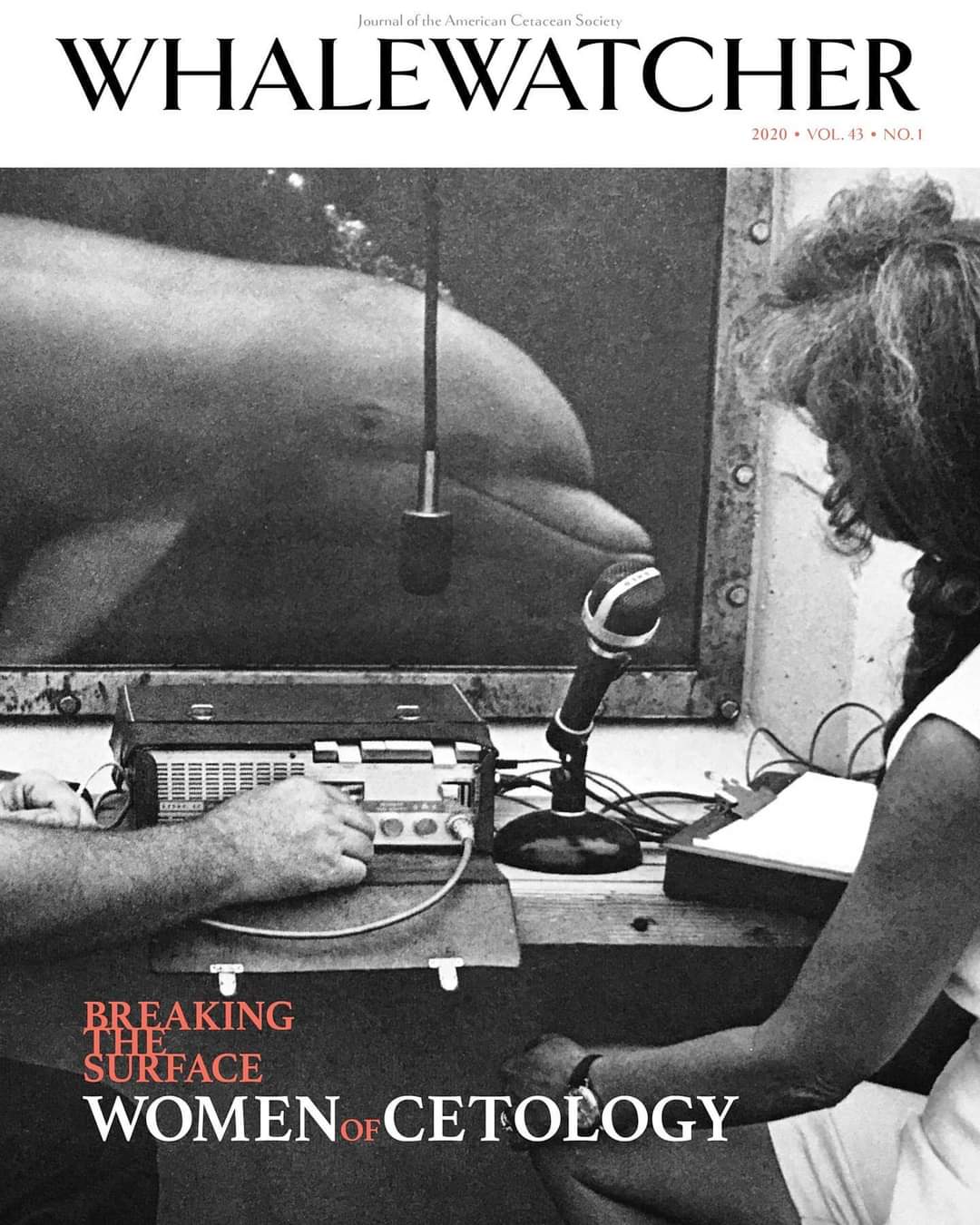
high resolution PDF
lower resolution PDF
Below is a sample of our most popular Whalewatcher issues.
 Vol 40:1 (2011): “Killer Whale: The Top, Top Predator”. Special Guest Editor, Robert L. Pitman. This 72-page, full-color issue is dedicated entirely to killer whales – ‘the whale with a culture’ – various ecotypes around the world, their ecological niches, unique conservation challenges, and a peek into the world of these highly intelligent and social, magnificent creatures – the top predators of the oceans. Vol 40:1 (2011): “Killer Whale: The Top, Top Predator”. Special Guest Editor, Robert L. Pitman. This 72-page, full-color issue is dedicated entirely to killer whales – ‘the whale with a culture’ – various ecotypes around the world, their ecological niches, unique conservation challenges, and a peek into the world of these highly intelligent and social, magnificent creatures – the top predators of the oceans. |
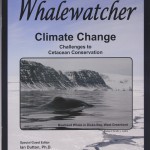 Vol 39:2 (2010): “Climate Change: Challenges to Cetacean Conservation”. Special Guest Editor, Ian Dutton. Scientists do not dispute the fact that climate change is happening, and at a pace beyond some species’ ability to evolve and adapt. Indeed, climate change is one of the most significant yet least understood threats to cetaceans today. It is therefore both appropriate and timely that an entire issue of Whalewatcher should be devoted to this global phenomenon. Vol 39:2 (2010): “Climate Change: Challenges to Cetacean Conservation”. Special Guest Editor, Ian Dutton. Scientists do not dispute the fact that climate change is happening, and at a pace beyond some species’ ability to evolve and adapt. Indeed, climate change is one of the most significant yet least understood threats to cetaceans today. It is therefore both appropriate and timely that an entire issue of Whalewatcher should be devoted to this global phenomenon. |
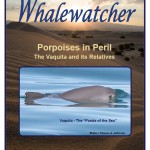 Vol 39:1 (2010):“Porpoises in Peril: The Vaquita and Its Relatives”. Special Guest Editor, Thomas A. Jefferson, Ph.D. This issue is dedicated exclusively to porpoises (Phocoenids) – enigmatic, imperiled, and hampered by a serious lack of baseline population and abundance data, the Phocoenids are a notoriously difficult group to study. Vol 39:1 (2010):“Porpoises in Peril: The Vaquita and Its Relatives”. Special Guest Editor, Thomas A. Jefferson, Ph.D. This issue is dedicated exclusively to porpoises (Phocoenids) – enigmatic, imperiled, and hampered by a serious lack of baseline population and abundance data, the Phocoenids are a notoriously difficult group to study. |
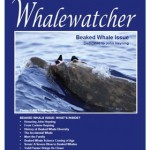 Vol 38:1 (2009): “Beaked Whale Issue: Dedicated to John Heyning”. This issue is dedicated to the memory of Dr. John Heyning, a highly-regarded whale biologist with a keen fascination for beaked whales, a stranding expert skilled at conducting necropsies on the most degraded carcasses, and the curator of one of the largest collections of marine mammal specimens in the world. Vol 38:1 (2009): “Beaked Whale Issue: Dedicated to John Heyning”. This issue is dedicated to the memory of Dr. John Heyning, a highly-regarded whale biologist with a keen fascination for beaked whales, a stranding expert skilled at conducting necropsies on the most degraded carcasses, and the curator of one of the largest collections of marine mammal specimens in the world. |
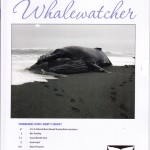 Vol 37:1 (2008):This Whalewatcher is dedicated entirely to the phenomenon of cetacean strandings. Vol 37:1 (2008):This Whalewatcher is dedicated entirely to the phenomenon of cetacean strandings. |
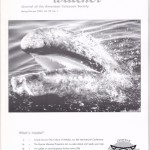 Vol 35:1 (2003): Featured articles include highlights of the 2002 ACS International Conference, The Culture of Whales (Seattle, WA), Defense Department assaults on the Marine Mammal Protection Act (MMPA), and updates on Low-Frequency Active Sonar. Vol 35:1 (2003): Featured articles include highlights of the 2002 ACS International Conference, The Culture of Whales (Seattle, WA), Defense Department assaults on the Marine Mammal Protection Act (MMPA), and updates on Low-Frequency Active Sonar. |
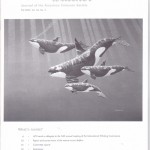 Vol 34:2 (2002): This issue presents the highlights of the 2002 annual meeting of the International Whaling Commission (IWC) in Shimonoseki, Japan, as well as the conservation status of the tucuxi dolphin in estuarine habitats of Brazil. Vol 34:2 (2002): This issue presents the highlights of the 2002 annual meeting of the International Whaling Commission (IWC) in Shimonoseki, Japan, as well as the conservation status of the tucuxi dolphin in estuarine habitats of Brazil. |
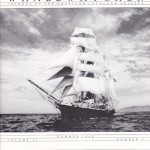 Vol 22:2 (1988): A tribute to the Regina Maris, a three-masted barkentine. Of all the ships that have sailed the sea, the Regina is among those that have contributed most to the study of whales worldwide. Vol 22:2 (1988): A tribute to the Regina Maris, a three-masted barkentine. Of all the ships that have sailed the sea, the Regina is among those that have contributed most to the study of whales worldwide. |
 Vol 32:1 (1999): “James Stephen Leatherwood (1944-1997).” This issue is a tribute to Dr. J. Stephen Leatherwood, renowned scientist, adventurer, mentor, and leader in the study and conservation of marine mammals. Vol 32:1 (1999): “James Stephen Leatherwood (1944-1997).” This issue is a tribute to Dr. J. Stephen Leatherwood, renowned scientist, adventurer, mentor, and leader in the study and conservation of marine mammals. |
|


 Vol 40:1 (2011): “Killer Whale: The Top, Top Predator”. Special Guest Editor, Robert L. Pitman. This 72-page, full-color issue is dedicated entirely to killer whales – ‘the whale with a culture’ – various ecotypes around the world, their ecological niches, unique conservation challenges, and a peek into the world of these highly intelligent and social, magnificent creatures – the top predators of the oceans.
Vol 40:1 (2011): “Killer Whale: The Top, Top Predator”. Special Guest Editor, Robert L. Pitman. This 72-page, full-color issue is dedicated entirely to killer whales – ‘the whale with a culture’ – various ecotypes around the world, their ecological niches, unique conservation challenges, and a peek into the world of these highly intelligent and social, magnificent creatures – the top predators of the oceans. Vol 39:2 (2010): “Climate Change: Challenges to Cetacean Conservation”. Special Guest Editor, Ian Dutton. Scientists do not dispute the fact that climate change is happening, and at a pace beyond some species’ ability to evolve and adapt. Indeed, climate change is one of the most significant yet least understood threats to cetaceans today. It is therefore both appropriate and timely that an entire issue of Whalewatcher should be devoted to this global phenomenon.
Vol 39:2 (2010): “Climate Change: Challenges to Cetacean Conservation”. Special Guest Editor, Ian Dutton. Scientists do not dispute the fact that climate change is happening, and at a pace beyond some species’ ability to evolve and adapt. Indeed, climate change is one of the most significant yet least understood threats to cetaceans today. It is therefore both appropriate and timely that an entire issue of Whalewatcher should be devoted to this global phenomenon. Vol 39:1 (2010):“Porpoises in Peril: The Vaquita and Its Relatives”. Special Guest Editor, Thomas A. Jefferson, Ph.D. This issue is dedicated exclusively to porpoises (Phocoenids) – enigmatic, imperiled, and hampered by a serious lack of baseline population and abundance data, the Phocoenids are a notoriously difficult group to study.
Vol 39:1 (2010):“Porpoises in Peril: The Vaquita and Its Relatives”. Special Guest Editor, Thomas A. Jefferson, Ph.D. This issue is dedicated exclusively to porpoises (Phocoenids) – enigmatic, imperiled, and hampered by a serious lack of baseline population and abundance data, the Phocoenids are a notoriously difficult group to study. Vol 38:1 (2009): “Beaked Whale Issue: Dedicated to John Heyning”. This issue is dedicated to the memory of Dr. John Heyning, a highly-regarded whale biologist with a keen fascination for beaked whales, a stranding expert skilled at conducting necropsies on the most degraded carcasses, and the curator of one of the largest collections of marine mammal specimens in the world.
Vol 38:1 (2009): “Beaked Whale Issue: Dedicated to John Heyning”. This issue is dedicated to the memory of Dr. John Heyning, a highly-regarded whale biologist with a keen fascination for beaked whales, a stranding expert skilled at conducting necropsies on the most degraded carcasses, and the curator of one of the largest collections of marine mammal specimens in the world. Vol 37:1 (2008):This Whalewatcher is dedicated entirely to the phenomenon of cetacean strandings.
Vol 37:1 (2008):This Whalewatcher is dedicated entirely to the phenomenon of cetacean strandings. Vol 35:1 (2003): Featured articles include highlights of the 2002 ACS International Conference, The Culture of Whales (Seattle, WA), Defense Department assaults on the Marine Mammal Protection Act (MMPA), and updates on Low-Frequency Active Sonar.
Vol 35:1 (2003): Featured articles include highlights of the 2002 ACS International Conference, The Culture of Whales (Seattle, WA), Defense Department assaults on the Marine Mammal Protection Act (MMPA), and updates on Low-Frequency Active Sonar. Vol 34:2 (2002): This issue presents the highlights of the 2002 annual meeting of the International Whaling Commission (IWC) in Shimonoseki, Japan, as well as the conservation status of the tucuxi dolphin in estuarine habitats of Brazil.
Vol 34:2 (2002): This issue presents the highlights of the 2002 annual meeting of the International Whaling Commission (IWC) in Shimonoseki, Japan, as well as the conservation status of the tucuxi dolphin in estuarine habitats of Brazil. Vol 22:2 (1988): A tribute to the Regina Maris, a three-masted barkentine. Of all the ships that have sailed the sea, the Regina is among those that have contributed most to the study of whales worldwide.
Vol 22:2 (1988): A tribute to the Regina Maris, a three-masted barkentine. Of all the ships that have sailed the sea, the Regina is among those that have contributed most to the study of whales worldwide. Vol 32:1 (1999): “James Stephen Leatherwood (1944-1997).” This issue is a tribute to Dr. J. Stephen Leatherwood, renowned scientist, adventurer, mentor, and leader in the study and conservation of marine mammals.
Vol 32:1 (1999): “James Stephen Leatherwood (1944-1997).” This issue is a tribute to Dr. J. Stephen Leatherwood, renowned scientist, adventurer, mentor, and leader in the study and conservation of marine mammals.